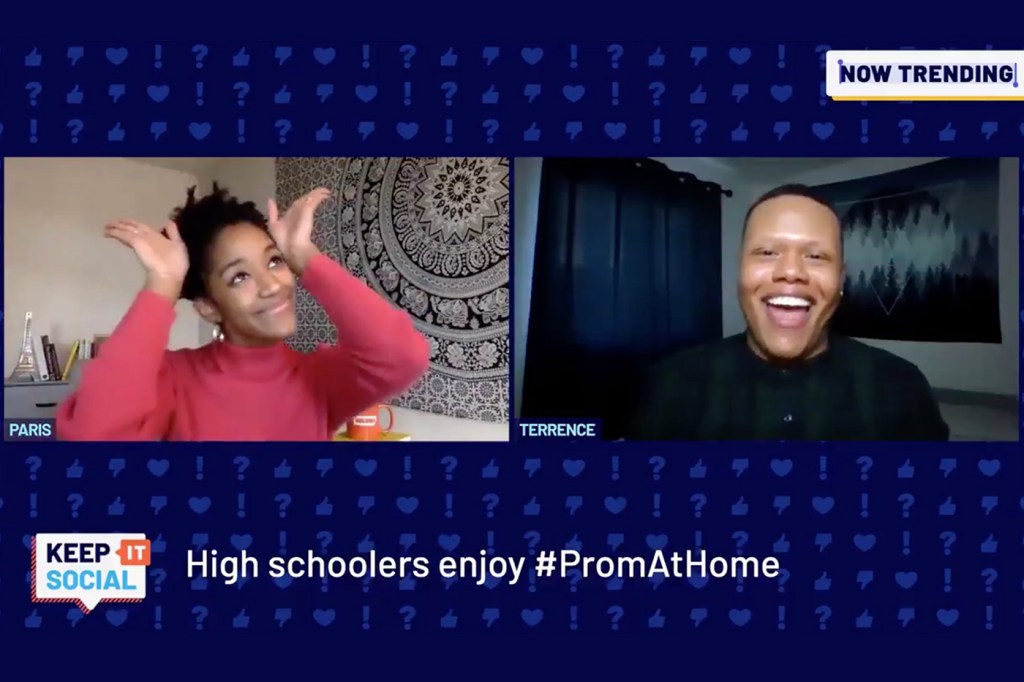If it’s trending on social media, Terrence Johnson has probably heard about it

If there’s a conversation happening on social media, you can bet Terrence Johnson is listening in. He’s got one ear tuned in to the banter on Twitter, and another to the exchanges on Facebook. He’s watching your videos on TikTok and tracking the trends on Instagram.
If this sounds like a full-time job, for Johnson it actually is. Because after he’s done listening, he’s reflecting and analyzing, writing and discussing, and formulating an outline for a weekly show targeted to a Gen Z and Millennial audience in which Johnson gets to host a conversation of his own about how social media users are engaging with the social, economic, and cultural issues of the day.

Terrence Johnson, the host of the new WGBH show, Keep It Social, earned his master’s degree in media advocacy from Northeastern. Photo courtesy of Terrence Johnson
The show is called Keep It Social, and it was launched in late April by WGBH, a public media broadcaster in Boston. Johnson, who earned his master’s degree in media advocacy from Northeastern, has been tapped to co-host the 30-minute program along with Paris Alston, a journalist who also works as an associate producer on the WBUR program, Radio Boston.
A “platform to raise the voices of the social media generation” is how Johnson describes Keep It Social, which streams on YouTube every Friday at 6 p.m. EDT.
“The goal of the show is basically to look at the conversations that are already happening online, on social, on our timelines, on our feeds, and then looking at the social impact,” he says. “How does this affect the person or the people on the other side of the screen? How does this resonate with them? How does this translate into their real world, everyday experience?”
Johnson and Alston have invited guests to chat about topics as wide-ranging as emerging social media platforms, the challenges of home-schooling during the COVID-19 pandemic, and the role of social media in giving sexual assault survivors a platform to share their stories. Their guests have included media personalities, influencers, journalists, and trade professionals.
“Our goal for the show is to always make it feel like it’s a group of friends having a conversation,” says Johnson. “You want it to be interesting, and lighthearted, and fun, and relatable, but still analytical, and still brings in the audience and makes them feel like they, too, are being recognized; they, too, are a part of the conversation.”
That the show allows space for diverse voices and perspectives is one of the things that drew Johnson to Keep It Social in the first place. After completing his apprenticeship at the CBS affiliate in Boston, WBZ, earlier this year, he was back on the job market, and looking for a role that would allow him to be in front of the camera without requiring him to filter his views, as he says he experienced at previous jobs.
“In traditional news, you are writing a lot of times for a particular audience in a particular way,” he says. “For me, that sometimes felt very silencing. I never wanted to be in a space where I had to silence or minimize who I was as a person, or my experiences, to appease someone else’s comfort levels.”
With Keep It Social, Johnson says, WGBH has given him the opportunity he was seeking to be both in front of the camera, and—as an associate producer—behind it. He says that being involved in the development of the show and the creative process was important to him.
The show was intended to be recorded in the WGBH studio, but because it didn’t air until after the pandemic hit, it is being taped remotely from the hosts’ and guests’ homes. Johnson typically records from a bedroom that he shares with his partner.
“You get to see a tapestry, some curtains, not anything super spectacular,” he says. “Probably the regular, everyday 24-year-old’s bedroom.”
A native of Mississippi, Johnson graduated from the University of Mississippi with a degree in broadcast journalism. He says he wanted to continue his education and live in a bigger city and Northeastern—and Boston, by extension—was the logical next step for him.
“I had a great foundation, which you can always improve, and I think I got that improvement at Northeastern with the mentorship and just the attention to detail to my work,” Johnson says. “Within that year and a half I grew as a storyteller, as an advocate, as a journalist. I also grew as a person.”
For media inquiries, please contact media@northeastern.edu.





